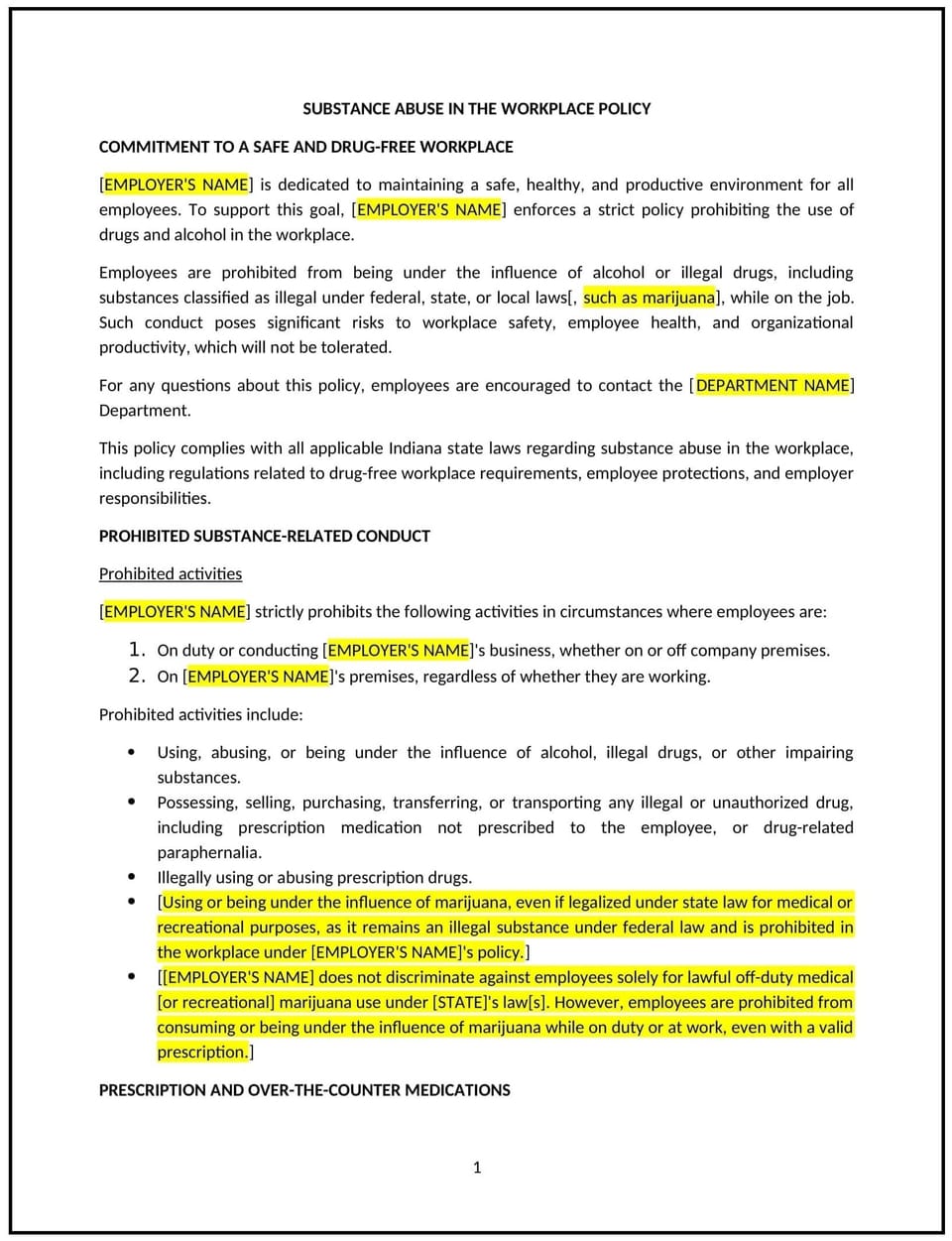Substance abuse in the workplace policy (Indiana): Free template

Substance abuse in the workplace policy (Indiana): Free template
This substance abuse in the workplace policy helps Indiana businesses create a safe and productive work environment by addressing the use, possession, or influence of drugs and alcohol at work. It establishes clear expectations, outlines prohibited behaviors, and provides procedures for addressing violations. The policy also includes support for employees dealing with substance abuse issues, such as access to employee assistance programs (EAPs) or rehabilitation resources.
By implementing this policy, Indiana businesses can promote workplace safety, support employee well-being, and reduce the risks associated with substance abuse.
How to use this substance abuse in the workplace policy (Indiana)
- Define prohibited behaviors: Clearly state that the use, possession, sale, or influence of drugs and alcohol is prohibited in the workplace and during work-related activities. Include exceptions, such as approved use of prescription medications.
- Outline testing procedures: Specify circumstances under which drug and alcohol testing may occur, such as pre-employment screening, random testing, or testing after an incident.
- Provide reporting guidelines: Explain how employees can confidentially report concerns about substance abuse, either for themselves or others, without fear of retaliation.
- Address prescription medications: Include a process for employees to disclose any prescription medication that could affect their ability to perform their duties safely.
- Offer support resources: Provide information about available resources, such as employee assistance programs (EAPs), counseling services, or referral to rehabilitation programs.
- Specify disciplinary actions: Outline the consequences for policy violations, including warnings, suspension, or termination, while emphasizing the business's commitment to supporting employees seeking help.
- Train managers: Ensure managers are equipped to identify signs of substance abuse and handle related issues sensitively and consistently.
- Review and update regularly: Periodically review the policy to ensure compliance with Indiana laws and reflect changes in workplace practices or available resources.
Benefits of using this substance abuse in the workplace policy (Indiana)
Implementing this policy provides several key benefits for Indiana businesses:
- Enhances workplace safety: Reduces the risk of accidents or injuries caused by substance abuse.
- Promotes employee well-being: Encourages employees to seek help for substance abuse issues and provides access to supportive resources.
- Protects business reputation: Maintains professionalism by addressing substance abuse issues proactively and consistently.
- Reduces liability risks: Aligns with Indiana laws and best practices for workplace safety and substance abuse management.
- Supports productivity: Minimizes disruptions caused by substance abuse, improving overall workplace efficiency.
- Encourages accountability: Sets clear expectations and consequences, ensuring employees understand their responsibilities.
Tips for using this substance abuse in the workplace policy (Indiana)
- Communicate the policy: Share the policy during onboarding and include it in the employee handbook to ensure all employees understand its purpose and expectations.
- Maintain confidentiality: Ensure that all reports and investigations related to substance abuse are handled discreetly and shared only with those directly involved.
- Encourage self-disclosure: Foster a supportive environment where employees feel comfortable seeking help for substance abuse issues before they escalate.
- Monitor compliance: Regularly assess adherence to the policy, particularly in high-risk environments where safety is critical.
- Provide regular training: Equip employees and managers with the knowledge to recognize and address substance abuse issues in the workplace.
- Partner with local resources: Collaborate with Indiana-based rehabilitation centers or counseling services to provide employees with easy access to support.
Q: What substances are covered under this policy?
A: The policy covers illegal drugs, alcohol, and the misuse of prescription medications or over-the-counter drugs that impair workplace safety or performance.
Q: How can businesses identify substance abuse in the workplace?
A: Signs of substance abuse may include erratic behavior, frequent absences, decreased performance, or safety incidents. Training managers to recognize these signs is essential.
Q: Are businesses required to conduct drug testing?
A: Indiana law does not mandate drug testing, but businesses can implement testing programs as part of their policy, provided they comply with state and federal regulations.
Q: How should businesses handle employees who test positive for substance use?
A: Businesses should follow the policy’s disciplinary procedures while offering resources for support or rehabilitation, where appropriate.
Q: What resources should businesses provide for employees dealing with substance abuse?
A: Businesses can offer access to employee assistance programs (EAPs), referrals to counseling services, or partnerships with local rehabilitation programs.
Q: Can employees use prescription medications at work?
A: Yes, employees can use prescribed medications, but they must notify management if the medication could impact their ability to perform their duties safely.
Q: How should businesses handle substance abuse concerns reported by employees?
A: Businesses should investigate reports promptly and confidentially, taking appropriate action based on the findings and ensuring no retaliation occurs against the reporting employee.
Q: How often should the policy be reviewed?
A: The policy should be reviewed annually or whenever there are changes in Indiana laws or workplace practices related to substance abuse.
This article contains general legal information and does not contain legal advice. Cobrief is not a law firm or a substitute for an attorney or law firm. The law is complex and changes often. For legal advice, please ask a lawyer.


